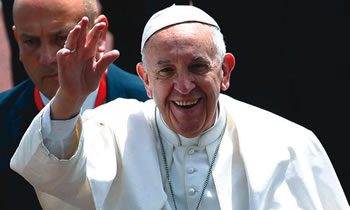Art, Consumerism, The Poor
 Art enriches human life
Art enriches human life
Throughout history, art has been second only to life in bearing witness to the Lord. It was, and remains, a majestic road allowing us more than by words and ideas to approach the faith, because it follows the same path of faith, that of beauty. The beauty of art enriches life and creates communion, because it unites God, humanity and creation in a single symphony. It connects the past, the present and the future, and it attracts – in the same place and with the same gaze – different and far-off peoples.
Contemplating great art, which expresses the faith, helps us rediscover what truly matters in life. In leading us both within and above ourselves Christian art points us to the love that created us, to the mercy which saves us, and to the hope that awaits us.
In today’s troubled world, unfortunately so often torn and damaged by selfishness and the thirst for power, art represents, perhaps even more than in the past, a universal need because it is a source of harmony and peace, and it expresses the dimension of generosity.
From an Address to Patrons of the Arts in the Vatican Museums
28 September 2018
Source: Holy See Website, http://w2.vatican.va
The enemy of generosity is consumerism
Generosity belongs to everyday life; it’s something we should think about: ‘How can I be more generous, with the poor, the needy… How can I help more? Consider the little things. For example, look through your room or your wardrobe. How many pairs of shoes do I have? One, two, three, four, fifteen, twenty… Each of us knows. Maybe too many… I knew a monsignor who had 40… But if you have many pairs of shoes, give away half. How many clothes do I not use or use only once a year? This is one way to be generous, to give what we have, and to share.
We can do miracles through generosity. Generosity in little things. Maybe we don’t do it because we just don’t think about it.
The Gospel message makes us reflect: How can I be more generous? Just a little more, not much… ‘It’s true, Father, you’re right but… I don’t know why, but I’m always afraid…’ And nowadays there is another disease, which works against generosity: The disease of consumerism.
From a Homily in Santa Marta,
26 November 2018
Source: Zenit
The Lord hears the cry of the poor
 In the face of contempt for human dignity, we often remain with arms folded or stretched out as a sign of our frustration before the grim power of evil. Yet we Christians cannot stand with arms folded in indifference, or with arms outstretched in helplessness. No. As believers, we must stretch out our hands, as Jesus does with us. The cry of the poor finds a hearing with God. Yet I ask, does it with us? Do we have eyes to see, ears to hear, hands outstretched to offer help? Or do we keep repeating: “Come back tomorrow”? “Christ himself appeals to the charity of his disciples in the person of the poor” (Gaudium et Spes, 88). He asks us to recognise him in all those who are hungry and thirsty, in the stranger and those stripped of dignity, in the sick and those in prison (cf. Matthew 25:35-36).
In the face of contempt for human dignity, we often remain with arms folded or stretched out as a sign of our frustration before the grim power of evil. Yet we Christians cannot stand with arms folded in indifference, or with arms outstretched in helplessness. No. As believers, we must stretch out our hands, as Jesus does with us. The cry of the poor finds a hearing with God. Yet I ask, does it with us? Do we have eyes to see, ears to hear, hands outstretched to offer help? Or do we keep repeating: “Come back tomorrow”? “Christ himself appeals to the charity of his disciples in the person of the poor” (Gaudium et Spes, 88). He asks us to recognise him in all those who are hungry and thirsty, in the stranger and those stripped of dignity, in the sick and those in prison (cf. Matthew 25:35-36).
The Lord stretches out his hand, freely and not out of duty. And so it must be with us. We are not called to do good only to those who like us. That is normal, but Jesus demands that we do something more (cf. Matthew 5:46): to give to those who have nothing to give back, to love gratuitously (cf. Luke 6:32-36). Let us look around in our own day. For all that we do, do we ever do anything completely for free, something for a person who cannot repay us? That will be our outstretched hand, our true treasure in heaven.
Stretch out your hand to us, Lord, and take hold of us. Help us to love as you love. Teach us to leave behind all that is passing, to be a source of reassurance to those around us, and to give freely to all those in need.
From a Homily on World Day of the Poor, 18 November 2018
Source: Libreria Editrice Vatican
 Entries(RSS)
Entries(RSS)